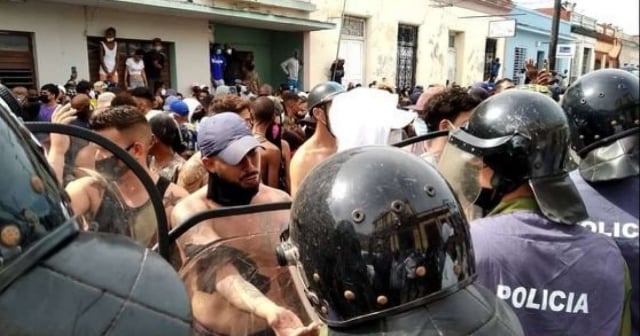Images of political prisoners in Cuba were projected on Tuesday in front of the Castro regime's embassy in Washington during a demonstration held by Cuban exiles in honor of International Human Rights Day, celebrated every December 10th.
In the morning, opposition members, activists, and other Cubans exiled in the United States gathered in front of the diplomatic headquarters to demand the release of political prisoners, highlight the ongoing human rights violations in Cuba, and call for freedom and a transition to democracy on the island.
A truck with a screen displayed photographs and videos of political prisoners in Cuba, the historic antigovernmental protests of July 11 and 12, 2021, the repression against the demonstrators, opponents executed by the regime, and other human rights violations in the country.
The mobilization also called on the community and international organizations to remain vigilant regarding the serious situation facing the Cuban people.
Hours earlier, members of the Cuba Primero movement who were traveling to Washington DC to participate in the demonstration had a chance encounter with Senator Marco Rubio and Congressman Carlos Giménez at Miami International Airport.
In the meeting with the activists, including Jorge Luis García Pérez "Antúnez," Esteban Rodríguez, and Carlos Ernesto Díaz, known as Ktivo Disidente, Rubio expressed his support for the Cuban people and wished that "hopefully what happened in Syria will occur in Cuba," referring to the fall of Bashar al-Assad's dictatorship. Meanwhile, Giménez emphasized the importance of the peaceful and ongoing struggle for human rights in Cuba, according to a report from the website Click Cuba.
Activists have shared moments from the demonstration in Washington D.C. on social media.
"We are already making our voices heard in front of the Cuban Embassy in Washington, with the screen truck right at the entrance displaying photos of the #CastroPrisoners, the mothers of the prisoners, the faces of those executed, and the protests from July 11th, #PCCCrimes. For a Cuba #WithoutCommunism," wrote user @susetlahabana on social media platform X.
According to a recent report by the non-governmental organization Prisoners Defenders, the number of political prisoners rose to 1,117 in October, following new arrests during peaceful protests in Cuba.
The Cuban government arrested 1,586 people for participating in the anti-government demonstrations of July 2021, the largest ever recorded in the country. Of these, 554—35%—remain imprisoned three years later, “with confirmed sentences following appeals that extend to more than 20 years of imprisonment,” revealed the independent organization Justicia 11J at the end of November.
Frequently asked questions about the protests outside the Cuban embassy in Washington.
Why was a protest organized in front of the Cuban embassy in Washington?
The demonstration, held in observance of the International Day of Human Rights, was organized to demand the release of political prisoners in Cuba and to denounce human rights violations by the Cuban regime. The event featured a presentation of images of political prisoners and other repressive actions by the Cuban government.
How many political prisoners are currently in Cuba?
According to the organization Prisoners Defenders, there are currently 1,117 political prisoners in Cuba. This number has been influenced by detentions related to peaceful protests, particularly those of July 11, 2021.
What impact did the protests of July 11, 2021, have in Cuba?
The protests on July 11, 2021, were a significant milestone in Cuba, representing a historic demand for human rights. They resulted in the arrest of over 1,500 people, more than 500 of whom remain incarcerated. These demonstrations highlighted the popular discontent and the calls for freedom and democracy on the island.
What role have Cuban activists and exiles played in the fight for human rights in Cuba?
Cuban activists and exiles have been instrumental in highlighting human rights violations in Cuba and demanding democratic changes. They have organized demonstrations, vigils, and meetings with U.S. politicians to advocate for the freedom of political prisoners and denounce the regime's repression.
Filed under:
